US Championship Match
Researched by Nick Pope
| Game | 1 | 2 | 3 | 4 | 5 | 6 | Wins |
| Mackenzie | ½ | 1 | 1 | 1 | 1 | 1 | 5 |
| Reichhelm | ½ | 0 | 0 | 0 | 0 | 0* | 0 |
Format: The winner of the first seven games to be declared the victor, draws not counting.
Time Control: 12 moves every 1 hour.
Purse: None.
Interesting Chess Match.—We have the pleasure of announcing that a match has been arranged between Mr. Reichhelm and Captain Mackenzie, the champion of the New York Tournament. The match will commence, in New York, in a few days, and will be a very exciting contest.
Daily Evening Bulletin, Philadelphia, 1866.03.09
Chess.—An Important Match Forthcoming.—A match of great interest to the chess players of this country, and one which will not be without its influence upon the estimation of American chess players abroad, will be commenced, at the New-York Chess Club, early next week. The contestants are Mr. Geo. H. Mackenzie, one of the best of the English players, and victor in the late tournament, and Mr. G. Richelm [sic], the best player in Philadelphia, and, after Mr. Murphy [sic], the first of American players. The match is to be decided by the winning of seven games by either player, and it is stipulated that neither shall consume more than an hour in making 12 moves. No money is to be staked upon the match, as the New-York and Philadelphia Chess Clubs object to the practice of betting upon chess, but the expenses of each player will be met by the opposing Club. Mr. Morphy, having practically retired from the game, the winner of this match will have a title to be considered the chess champion of the United States.
New York Daily Tribune, 1866.03.10
Chess—Philadelphia vs. New-York. As a sequel to the late Tournament of the New-York Chess Club, a match has at length been definitely arranged between Capt. G. H. Mackenzie, of the New-York clubs, and Mr. Reichelen [sic], champion of the Philadelphian chess-players. The conditions of the encounter are that the first winner of seven games is to be declared the conqueror; that the time allowed for consideration of each move shall not exceed an average of five minutes, but may be vided in such manner as may suit the player, provided that he does not consume more than two hours for twenty-four moves, and that the hours of play shall be daily from 2 to 5 and 8 to 11 P.M. Mr. Reichelin [sic] arrived in this City yesterday afternoon, and the commencement of play was agreed upon for 8 o'clock in the evening, with scarcely a possibility, however, of getting through the first game without adjournment.
New York Times, 1866.03.16
Chess—Commencement of the Reichhelm-Mackenzie Match.—The match at chess between Messrs. Mackenzie and Reichhelm, to which we referred a few days ago, was commenced last night at the New-York Chess Club. Although but a short notice of Mr. Reichhelm's arrival had been given, the play was witnessed by about 50 gentlemen, among them Messrs. Irving, the President of the Club, Mead, Stanley, Wells of Philadelphia, Ware of Boston, Breutzinger [sic], Zerega, Berneir, Barnet [sic] and Warner. The first game between the distinguished contestants was begun at 8 p.m., and at 11 o'clock, the hour of adjournment, the board had been pretty well cleared of pieces, and Mr. Reichhelm was the gainer of a pawn. Capt. Mackenzie had the opening and played the "Ruy Lopez Knight's Game." The game will be continued this afternoon at 2 p.m.
New York Daily Tribune, 1866.03.16
The Philadelphia-New York Match. We alluded, last week, briefly to the fact that a match has been arranged between Mr. Reichhelm, of this city, and Mr. George H. Mackenzie, the champion of the New York Tournament. It has been the intention of the Philadelphia Club to challenge whoever might be the winner in the late contest in New York, and the match which we have had the pleasure of arranging between Messrs. Reichhelm and Mackenzie is the result of that purpose. [...]
The present match, which commenced last evening, at the New York Chess Club, is for the first seven games. By mutual consent, the moves are to be limited to an average of five minutes, and only one game is to be played at each sitting, unless otherwise agreed upon. Mr. Mackenzie has already played several important matches with Messrs. Anderssen, Deacon, McDonnell and Medley, besides his recent play in the New York Tournament, while Mr. Reichhelm has as yet played none but unimportant matches with members of the Philadelphia Club, and occasional off-hand contests with visitors from abroad. We shall report the progress of the match from day to day, in our regular editions.
The present match, which commenced last evening, at the New York Chess Club, is for the first seven games. By mutual consent, the moves are to be limited to an average of five minutes, and only one game is to be played at each sitting, unless otherwise agreed upon. Mr. Mackenzie has already played several important matches with Messrs. Anderssen, Deacon, McDonnell and Medley, besides his recent play in the New York Tournament, while Mr. Reichhelm has as yet played none but unimportant matches with members of the Philadelphia Club, and occasional off-hand contests with visitors from abroad. We shall report the progress of the match from day to day, in our regular editions.
Daily Evening Bulletin, Philadelphia, 1866.03.16
An Interesting Match At Chess. One which will no doubt prove to be of great interest to the chess players of this country, and one which is calculated to have its influence upon the estimation of American chess players abroad, will be commenced, at the New York Chess Club, early next week. The combatants are Mr. Geo. H. Mackenzie, one of the best of English players, and victor in the late tournament, and Mr. G. Richelm [sic], the best player in Philadelphia, and, after Mr. Morphy, the first of American players. The match is to be decided by the winning of seven games by either player, and it is stipulated that neither shall consume more than an hour in making 12 moves. No money is to be staked upon the match, as the New York and Philadelphia Chess Clubs object to the practice of betting upon chess, but the expenses of each player will be met by the opposing club. Mr. Morphy, having practically retired from the game, the winner of this match will have a title to be considered the Chess Champion of the United States.
New York Clipper, 1866.03.17
Philadelphia and New York. A match of seven games is pending, between Captain Mackenzie, the winner in the late N. Y. Club tournament, and Mr. G. Reichhelm, the strongest player amount the Philadelphians. It comes off here, at the Club Room in the University Building. The first game was to be played on Thursday evening.
Albion, New York, 1866.03.17
The Grand Match Between Philadelphia and New-York. In conformity with a previous announcement in this paper, the grand trial of skill between the well-known chess players, Mr. Reichhelm and Capt. Mackenzie, the respective representatives of the Philadelphia and New-York amateurs, was commenced on Thursday evening, at 8 o'clock precisely. The attendance both of members and visitors at the rooms of the New-York Club was very large, and represented the elite of the chess fraternity of this City and its environs, several gentlemen from Philadelphia being likewise present.
Up to a late hour last evening, this eventful encounter had progressed as follows:
Up to a late hour last evening, this eventful encounter had progressed as follows:
New York Times, 1866.03.17
Chess in New York. First game in the match between Mr. G. Reichhelm, of Philadelphia, and Captain Mackenzie, of New York.
Daily Evening Bulletin, Philadelphia, 1866.03.17
Date: 1866.03.15 & 1866.03.16
Site: USA New York, NY (University Building)
Event: US Championship, Game 1
White: Mackenzie,GH
Black: Reichhelm,GC
Opening: [C84] Spanish
Site: USA New York, NY (University Building)
Event: US Championship, Game 1
White: Mackenzie,GH
Black: Reichhelm,GC
Opening: [C84] Spanish
- 1.e4 e5 2.Nf3 Nc6 3.Bb5 a6 4.Ba4 Nf6 5.0-0 Be7 6.Nc3 b5 7.Bb3 0-0 8.d3 h6 9.Nd5 d6 10.h3 Na5
- Bulletin: Excellently played—relieving himself at once from all constraint.
- 11.Nxe7+ Qxe7 12.Nh2 Nxb3 13.axb3 Nh7 14.f4 f5 15.fxe5 dxe5 16.exf5 Bxf5 17.Be3 Qe6 18.Qd2 Nf6 19.Rae1
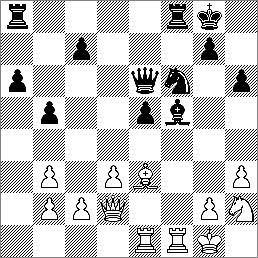
- 19...e4
- Times: This pawn, despite its isolated position, forms a very strong point in Black's game.
- Bulletin: Black was apparently in a critical position; but by this move "from the nettle danger he plucks the flower safety."
- 20.Bc5 Rf7 21.b4 Qd7
- Pope: The Daily Evening Bulletin gives the move as 21...Qd5.
- 22.Qf2 Bh7 23.d4
- Bulletin: This move, which is almost forced, proves the wisdom of Black's nineteenth move, as he has now secured a well-protected passed pawn.
- 23...Re8 24.Qg3 Qe6 25.Nf3 Nd7 26.Ne5
- Times: Capt. Mackenzie here suffers the loss of a pawn; but the fact is, finding the attack likely to change hands, he adopts this course of play for the purpose of insuring a drawn game—now almost inevitable in consequence of opposing bishops commanding squares of a different color.
- Bulletin: White cannot safely take the c-pawn, and evinces excellent judgment in thus playing for a draw.
- 26...Nxe5 27.dxe5 Qxe5 28.Qxe5 Rxe5 29.Rxf7 Kxf7
- Bulletin: The bishops being of different colors, it seems now impossible for the game, with correct play, to be other than drawn.
- 30.Bd4 Rd5 31.c3 h5 32.Re3 Bf5 33.Rg3 g6 34.Re3 Rd8 35.Re1 Ra8 36.Ra1 Ke6 37.Kf2 Kd5 38.Ke3 Kc4
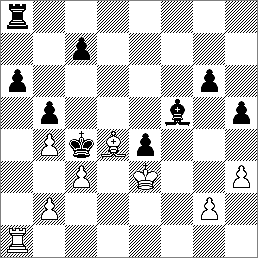
- 39.Ra3
- Bulletin: White has now, with great skill, established himself in an almost impregnable position.
- 39...Bd7
- Times: At this period of the game the hour of adjournment, 11 o'clock, having arrived, further play was postponed until 2 P.M. yesterday, when it was resumed as follows:
- 40.b3+ Kd5 41.Ra2 Bf5 42.Kf4 Rf8 43.Ke3 Bc8
- Times: And the game, having been prolonged for ten more moves, was at length abandoned by Mr. Reichhelm as hopelessly drawn.
- Pope: The gamescore in the New York Times ends here.
- 44.Rd2 Ke6
- Bulletin: Black's only chance of winning was by giving up this pawn.
- 45.Kxe4 Rf1 46.Re2 Bb7+ 47.Kd3+ Kd7 48.g3 Rf3+ 49.Re3 Rxe3+ 50.Bxe3 Bg2 51.h4 Ke6 52.Bf4 c6 53.Kd4 Bd5 ½-½
- Bulletin: And the game was drawn by mutual consent. Time, 3 hours 50 minutes.
New York Times, 1866.03.17
Daily Evening Bulletin, Philadelphia, 1866.03.17
Daily Evening Bulletin, Philadelphia, 1866.03.23
Oxford Encyclopedia of Chess, p431 (cites: Kingston Journal)
GAME II. After a short recess, at about 3 P.M., hostilities were resumed and a second game commenced, when Mr. Reichhelm, having the first move, led off in very dashing style, with the attack known as the Evans Gambit, wherein, for strategic reasons, on the thirteenth move he sacrificed his king's knights for adverse king's bishop's pawns. At the usual hour for adjournment, 5 P.M., 26 moves had been made on either side, the attitude of the contending forces being highly critical, and the evening session awaited with corresponding interest by a large and critical gallery of spectators. Punctually at 8 o'clock play was again resumed, and notwithstanding a desperate struggle, in the course of which Mr. Reichhelm succeeded in recovering a portion of the advantage lost, he succumbed to an inevitable checkmate, occurring on the fifty-fifth move, at 9:30 o'clock.
New York Times, 1866.03.17
The second game began on Friday afternoon, Mr. Reichhelm opening an Evans's Gambit. Much fine play was exhibited in this game, which was a beautiful specimen of this celebrated opening.
[From To-day's New York Tribune.]
The second game was immediately commenced, and Mr. Reichhelm, having the move, adopted the aggressive opening known as the Evans's Gambit. In the early part of the game, to maintain his attacks, he sacrifices a Knight, and, with the same object, declined a subsequent chance to regain. The assault, which he gained, did not, however, prove compensative for the price paid for it; and, after a lengthened contest, during which the game was reduced to an interesting end-position, Mr. Reichhelm resigned upon the fifty-fifth move.
Daily Evening Bulletin, Philadelphia, 1866.03.17
Date: 1866.03.16
Site: USA New York, NY (University Building)
Event: US Championship, Game 2
White: Reichhelm,GC
Black: Mackenzie,GH
Opening: [C51] Evans Gambit
Site: USA New York, NY (University Building)
Event: US Championship, Game 2
White: Reichhelm,GC
Black: Mackenzie,GH
Opening: [C51] Evans Gambit
- 1.e4 e5 2.Nf3 Nc6 3.Bc4 Bc5 4.b4 Bxb4 5.c3 Bc5 6.0-0 d6 7.d4 exd4 8.cxd4 Bb6 9.Bb2 Na5 10.Bd3 Ne7 11.Ng5 h6 12.Qh5 Ng6 13.Nxf7 Kxf7 14.e5 Qg5 15.Qf3+ Ke8 16.exd6 cxd6
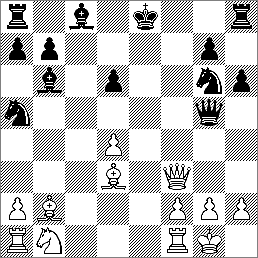
- 17.Nc3
- Bulletin: Simply miraculous. B-Bsq, attacking the queen would have forced the recapture of the knight, with a fine winning game.
- 17...Ne7 18.Ne4 Qd5 19.Rfe1 Kd8 20.Ba3 Bc7 21.Rac1 Nac6 22.Bc4 Qf5 23.Qg3 Qg6 24.Qxg6 Nxg6 25.Bxd6 Bxd6 26.Nxd6 Rf8 27.Nf7+ Kc7 28.d5 Rxf7 29.d6+ Kxd6 30.Bxf7 Nge5 31.Bb3 Bf5 32.Rcd1+ Kc7 33.Rd5 Re8 34.f4 Nf3+ 35.gxf3 Rxe1+ 36.Kf2 Rh1
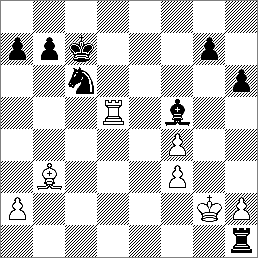
- 37.Kg2
- Bulletin: We believe it would have been better to take the bishop. The loss of the pawn was of less importance than preserving White's rook.
- 37...Be6 38.Kxh1 Bxd5 39.Bxd5 Kd6 40.Bf7 Nd8 41.Bg8 Ne6 42.Kg2 Nxf4+ 43.Kg3 Ke5 44.Kg4 b5 45.Bf7 a5 46.Be8 b4 47.Ba4 Nd5 48.Kh5 Kf6 49.Bb3 Nc3 50.Kg4 a4 51.Bc2 b3 52.Bxb3 axb3 53.axb3 Nd5 54.Kh4
- Pope: The Oxford Encyclopedia of Chess gives the following ending 54.Kh5 Kf5 55.h3 Nf4+ 0-1.
- 54...Kf5 55.h3 Nf6 0-1
- Bulletin: And Mr. Reichhelm resigns. .
Daily Evening Bulletin, Philadelphia, 1866.03.23
Oxford Encyclopedia of Chess, p431 (cites: Kingston Journal)
GAME III. Immediately after the conclusion of Game II., the pieces were reset for number three; when Capt. Mackenzie once more attacked after the manner of Ruy Lopez. We left the scene of conflict at a late hour, and although lookers-on have no right to make remarks upon a game during its progress, there can be little harm in stating that all the advantages of position appeared to us to be in favor of the New-York player.
New York Times, 1866.03.17
In the blind game, which was immediately begun, Mr. Mackenzie again opened with the Ruy Lopez Knight's Game. Mr. Reichhelm made a disastrous mistake by hasty play, in the opening, losing a piece, and no subsequent efforts, although he struggled gallantly, were efficacious to save the game, which he resigned on the thirty-first move.
Daily Evening Bulletin, Philadelphia, 1866.03.17
Date: 1866.03.16
Site: USA New York, NY (University Building)
Event: US Championship, Game 3
White: Mackenzie,GH
Black: Reichhelm,GC
Opening: [C67] Spanish
Site: USA New York, NY (University Building)
Event: US Championship, Game 3
White: Mackenzie,GH
Black: Reichhelm,GC
Opening: [C67] Spanish
- 1.e4 e5 2.Nf3 Nc6 3.Bb5 Nf6 4.0-0 Nxe4 5.d4 Nxd4 6.Nxd4
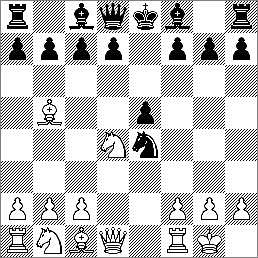
- 6...exd4
- Bulletin: An unaccountable blunder.
- 7.Re1 f5 8.f3 Bd6 9.fxe4 Bxh2+
- Bulletin: Rash as this looks, after losing the knight, it was perhaps the best line of play. Black could not afford to give White a moment's breathing time.
- 10.Kxh2 Qh4+ 11.Kg1 0-0 12.Bc4+ d5 13.Bxd5+ Kh8 14.e5 c6 15.Bb3 f4 16.Qe2 Bg4 17.Qf2 Qh5 18.Nd2 f3 19.Rf1 Rf5 20.Nxf3 Raf8 21.Qg3 Bxf3 22.Rxf3 h6 23.e6 Rxf3 24.gxf3 Rxf3 25.Qg2
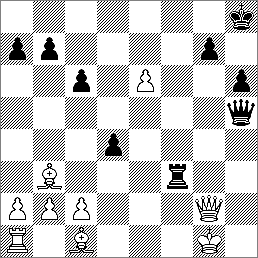
- 25...Rf6
- Bulletin: All through this game, after the first fatal blunder, Black shows the best qualities of a chess player.
- 26.Bf4 Rxf4 27.e7 d3 28.Qg3 d2 29.Qxf4 d1Q+ 30.Rxd1 Qxd1+ 31.Kf2
- Pope: The gamescore in the Oxford Encyclopedia of Chess ends here.
- 31...Qd7 1-0
- Bulletin: And Mr. Reichhelm resigned.
Daily Evening Bulletin, Philadelphia, 1866.03.23
Oxford Encyclopedia of Chess, p431 (cites: Kingston Journal)
The fourth game will be commenced this afternoon at 2 o'clock.
Daily Evening Bulletin, Philadelphia, 1866.03.17
[The result of the game of Saturday afternoon is more remarkable, as Mr. Reichhelm's position, after an hour's play, was apparently a very fine one. He was laboring, on Saturday morning, under a temporary indisposition, but we did not suppose it would be sufficient to affect his play as it seems to have done. It must have been some most extraordinary oversight that lost the game.—Ed. Bulletin.]
Daily Evening Bulletin, Philadelphia, 1866.03.19
Date: 1866.03.17
Site: USA New York, NY (University Building)
Event: US Championship, Game 4
White: Reichhelm,GC
Black: Mackenzie,GH
Opening: [C84] Spanish
Site: USA New York, NY (University Building)
Event: US Championship, Game 4
White: Reichhelm,GC
Black: Mackenzie,GH
Opening: [C84] Spanish
- 1.e4 e5 2.Nf3 Nc6 3.Bb5 a6 4.Ba4 Nf6 5.d4 exd4 6.0-0 Be7 7.e5 Ne4 8.Nxd4 Nxd4 9.Qxd4 Nc5 10.Nc3 Nxa4 11.Qxa4 0-0 12.Be3 d5 13.Rad1 c6 14.f4 f6 15.Qb3 Kh8 16.Bd4 Bg4 17.Rd2 fxe5 18.Bxe5 Bc5+ 19.Kh1 Qe7 20.Re1 Rxf4 21.Rde2 Rf5 22.Bxg7+ Qxg7 23.Re8+ Rxe8 24.Rxe8+ Rf8 25.Re1 Qe5 0-1
Oxford Encyclopedia of Chess, p431 (cites: Kingston Journal)
Chess—The Reichhelm-Mackenzie Match.—The way in which this match has progressed, thus far, is exciting great astonishment among those who are familiar with the respective strength of the two contestants, and seems to prove that chess, as well as other games, is pervaded by a "glorious uncertainty." Mr. Reichhelm the American player, has exhibited some exceedingly fine play, but has managed, through some lamentable mischance, to make some blunder in the early part of each game, except the first, from the effect of which no after-efforts have been able to shield him. Yesterday afternoon he lost his fourth game, by weak play in the opening, Mr. Mackenzie having again attacked him with the formidable "Ruy Lopez." In the evening Mr. Reichhelm commenced with his favorite "Evan' Gambit," and the game was proceeding lively when on the 18th move he perpetrated a mistake, which lost him a couple of pawns, and allowed an exchange of queens. After this he made a grand rally, organized a powerful assault upon his adversary's king, and the "exchange" converted that gain into a piece, but finally lost through his minority of pawns. He played this part of the game in a style worthy of Labourdonnais. The score now stands, Mackenzie, 5. Reichhelm, 0. Drawn 1.
New York Daily Tribune, 1866.03.20
Date: 1866.03.19
Site: USA New York, NY (University Building)
Event: US Championship, Game 5
White: Mackenzie,GH
Black: Reichhelm,GC
Opening: [C67] Spanish
Site: USA New York, NY (University Building)
Event: US Championship, Game 5
White: Mackenzie,GH
Black: Reichhelm,GC
Opening: [C67] Spanish
- 1.e4 e5 2.Nf3 Nc6 3.Bb5 Nf6 4.0-0 Nxe4 5.d4 Be7 6.Qe2 d5 7.Nxe5 Bd7 8.Nxd7 Qxd7 9.f3 Nf6 10.Re1 Kf8 11.Bxc6 bxc6 12.Be3 c5 13.Qf2 cxd4 14.Bxd4 Qc6 15.Nc3 Nd7 16.Bxg7+ Kxg7 17.Rxe7 Rhe8 18.Qd4+ Nf6 19.Rae1 Rxe7 20.Rxe7 Qd6 21.Re5 c5 22.Qf4 Rd8 23.Qg5+ Kh8 24.Rf5 c4 25.Qxf6+ Qxf6 26.Rxf6 1-0
Oxford Encyclopedia of Chess, p431 (cites: Kingston Journal)
The Great Match Between Philadelphia and New-York. The exciting contest between Mr. Reichhelm, the Philadelphia Chess champion, and Capt. Mackenzie, winner of the late Tournament of New-York amateurs, has been brought to a sudden termination by the resignation of the former player. According to the terms of the match the winning of seven games became necessary to constitute a victory on either side; and so far as the play progressed, six games only had been played, of which number Capt. Mackenzie had won five, the one remaining having been drawn. A defeat so signal is certainly somewhat unusual among players deemed at all well matched; but the effects of that to which Mr. Reichhelm has now so courteously succumbed, will be greatly diminished from the consideration of the far greater opportunities for good practice which his able antagonist has enjoyed than could have fallen to his lot of late years in Philadelphia; and we doubt not that the fulsome and absurd adulation from which Mr. Reichhelm has suffered at the hands of certain ill-advised admirers having access, strangely enough, to the columns of a portion of the press have been as annoying to him as they have been offensive to good taste generally, and the feelings of true chess players in particular.
The below printed is the sixth and last game occurring in this match, and, with exception of Game I, given in the Times of last Saturday, will be found the best contested and most interesting of the series.
The below printed is the sixth and last game occurring in this match, and, with exception of Game I, given in the Times of last Saturday, will be found the best contested and most interesting of the series.
New York Times, 1866.03.21
Date: 1866.03.19
Site: USA New York, NY (University Building)
Event: US Championship, Game 6
White: Reichhelm,GC
Black: Mackenzie,GH
Opening: [C51] Evans
Site: USA New York, NY (University Building)
Event: US Championship, Game 6
White: Reichhelm,GC
Black: Mackenzie,GH
Opening: [C51] Evans
- 1.e4 e5 2.Nf3 Nc6 3.Bc4 Bc5 4.b4 Bxb4 5.c3 Bc5 6.0-0 d6 7.d4 exd4 8.cxd4 Bb6 9.Bb2 Na5 10.Bd3 Ne7 11.Ng5 h6 12.Qh5 0-0
- Times: A better move, apparently, than that adopted in the case of Game II., wherein Capt. Mackenzie played 12...Ng6, which would seem to give his opponent an opportunity of sacrificing his K Kt for K B P, and subsequently recovering the piece with some advantage.
- 13.e5 Bf5 14.Bxf5 Nxf5 15.Nf3 Qd7 16.Nbd2 d5 17.g4 g6
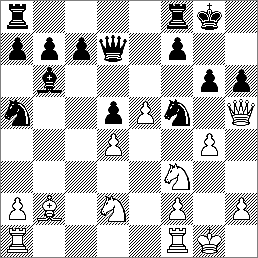
- 18.e6
- Bulletin: This move loses the game, and was the result of one of those miscalculations which Mr. Reichhelm seemed unable to avoid.
- 18...gxh5 19.exd7 hxg4 20.Ne5 Bxd4 21.Bxd4 Nxd4 22.Nxg4 Kg7 23.Kh1 Rad8 24.Rg1 Ne2 25.Rg2 Nf4 26.Rg3 Ng6 27.f4
- Bulletin: The commencement of an attack which is carried on with great ability, and which almost saves the game.
- 27...Nxf4 28.Rf1 Ng6 29.Nf6 Nc6 30.h4 Kh8 31.Rfg1
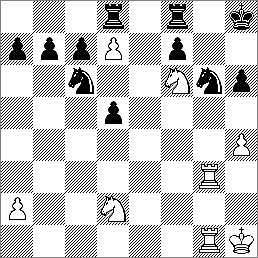
- 31...h5
- Times: All these moves are well played by Mr. Reichhelm, who preserves a most galling attack upon his opponent.
- 32.Rg5 Nce5 33.Rxh5+ Kg7 34.Ne8+ Rfxe8 35.dxe8Q Rxe8 36.Rf5 Rh8 37.h5 f6 38.Rxe5 fxe5 39.Rxg6+
- Bulletin: Mr. Reichhelm has now arrested a piece from his adversary, but the lost pawns are fatal to his chances.
- 39...Kf7 40.Rg5 Kf6 41.Nf3 e4 42.Rg6+ Ke7 43.Nd4 Rxh5+ 44.Kg2 a6 45.Kg3 Kf7 46.Rg4 Kf6 47.Nb3 b6 48.Rg8 Rg5+ 49.Rxg5 Kxg5 (...) 0-1
- Times: After this exchange or rooks, Black's chance of drawing the game appears to be quite hopeless. It was continued, however, until the sixtieth move, when Mr. Reichhelm resigned.
- Bulletin: A few more moves were played, but the array of pawns which Mr. Mackenzie has preserved is so strong that Mr. Reichhelm has at this point no chance of saving the game.
New York Times, 1866.03.21
Daily Evening Bulletin, Philadelphia, 1866.03.23
Oxford Encyclopedia of Chess, p431 (cites: Kingston Journal)
Daily Evening Bulletin, Philadelphia, 1866.03.21
The Reichhelm-Mackenzie Match. We doubt if anybody has been as much astonished at the result of this match as Captain Mackenzie himself. In six sittings the contest was decided by the resignation of Mr. Reichhelm, he having failed to score a single game against Captain Mackenzie's five. We regret, on some accounts, that the battle was not fought out, but Mr. Reichhelm is, of course, the best judge of the propriety of continuing such up-hill work.
We have no intention of making excuses for this unexpected result of the match. We are naturally disappointed at it, as we had every reason to expect a very different issue, both from our general knowledge of our colleague's real Chess strength and from the result of his former play with his recent antagonist. We have no fault to find with anything or anybody connected with this match. Mr. Reichhelm and our self were received and treated with every courtesy, as might have been expected, and we are satisfied that the disappointment felt in Philadelphia is shared by many of the New York gentlemen who witnessed the match.
There are one or two remarks which we may make without at all detracting from the laurels of the winner of this contest. In our judgment the result illustrates very strongly the advantage of practice in match playing. Out of sheer nervousness arising from the novelty of his position, Mr. Reichhelm played a full Knight below his ordinary strength, all through the match. In every instance (at least in the four games which we have seen at this time of writing) Mr. Reichhelm committed blunders so glaring as to prove that he was not at all in training for a contest with an experienced steady opponent. In the actual matter of Chess-play, we do not hesitate to express the opinion that the superiority was on Mr. Reichhelm's side. In no case was he outplayed by his adversary. Captain Mackenzie very sensibly adopted the wary policy of husbanding his forces, and allowing his antagonist to exhaust himself in his powerful attacks, counting upon the losses in the early part of the games to tell, as they always did, upon the issue.
We do not like to refer to the theory advanced by the New York Tribune, in explanation of Mr. Reichhelm's failure. We were aware of his indisposition as early in the match as Saturday morning, but urged him to play at the usual hour. Knowing how liable any proposition for postponement was to misrepresentation, we thought it better to risk the loss of a game than to be thought desirous of evading the issue.
Mr. Reichhelm is yet a comparatively you Chess player, and we believe that the effect of this match will not be lost upon him. The experience, bought at so high a price, is most valuable, and we hope at some future day to see him again cross swards with his late antagonist.
Captain Mackenzie has fairly won the American championship, but we doubt if he will long be allowed to enjoy his laurels unchallenged. These contests give a greatly increased interest to the noble game, and there are not a few ambitious aspirants for Captain Mackenzie's laurels. He has gained them in a fair fight, and we congratulate him upon his victory.
We have no intention of making excuses for this unexpected result of the match. We are naturally disappointed at it, as we had every reason to expect a very different issue, both from our general knowledge of our colleague's real Chess strength and from the result of his former play with his recent antagonist. We have no fault to find with anything or anybody connected with this match. Mr. Reichhelm and our self were received and treated with every courtesy, as might have been expected, and we are satisfied that the disappointment felt in Philadelphia is shared by many of the New York gentlemen who witnessed the match.
There are one or two remarks which we may make without at all detracting from the laurels of the winner of this contest. In our judgment the result illustrates very strongly the advantage of practice in match playing. Out of sheer nervousness arising from the novelty of his position, Mr. Reichhelm played a full Knight below his ordinary strength, all through the match. In every instance (at least in the four games which we have seen at this time of writing) Mr. Reichhelm committed blunders so glaring as to prove that he was not at all in training for a contest with an experienced steady opponent. In the actual matter of Chess-play, we do not hesitate to express the opinion that the superiority was on Mr. Reichhelm's side. In no case was he outplayed by his adversary. Captain Mackenzie very sensibly adopted the wary policy of husbanding his forces, and allowing his antagonist to exhaust himself in his powerful attacks, counting upon the losses in the early part of the games to tell, as they always did, upon the issue.
We do not like to refer to the theory advanced by the New York Tribune, in explanation of Mr. Reichhelm's failure. We were aware of his indisposition as early in the match as Saturday morning, but urged him to play at the usual hour. Knowing how liable any proposition for postponement was to misrepresentation, we thought it better to risk the loss of a game than to be thought desirous of evading the issue.
Mr. Reichhelm is yet a comparatively you Chess player, and we believe that the effect of this match will not be lost upon him. The experience, bought at so high a price, is most valuable, and we hope at some future day to see him again cross swards with his late antagonist.
Captain Mackenzie has fairly won the American championship, but we doubt if he will long be allowed to enjoy his laurels unchallenged. These contests give a greatly increased interest to the noble game, and there are not a few ambitious aspirants for Captain Mackenzie's laurels. He has gained them in a fair fight, and we congratulate him upon his victory.
Daily Evening Bulletin, Philadelphia, 1866.03.23
Captain Mackenzie, the winner in the late N. Y. Chess Club Tournament, has also won the match above-named. A drawn game at the start led to the hope that the contest would be a close one; but the Captain, having subsequently won five games in succession, Mr. Reichhelm, on Tuesday afternoon, abandoned the conflict as a hopeless one on his side. The games have been so widely published by the daily papers, that we do not give them place.
Albion, New York, 1866.03.24
Chess In The Metropolis.—Last week we gave the result of the great chess match between Captain Mackenzie, of this city, and Mr. Reichhelm, of Philadelphia, up to that time, when, it will be remembered, the former had gained considerable advantage. Play was resumed on Monday, and the match resulted on Tuesday in the victory of the Captain, by the resignation of Mr. Reichhelm, on the plea of sickness, under which he had labored since the Friday previous. It is unfortunate that Mr. Reichhelm should have been obliged to resign for such a cause, as this match was looked upon as a test of strength between the leading players of the two cities. We therefore hope that another meeting may be arranged so soon as the gentleman from the Quaker City shall have recovered his health. The result of the late encounter was: Captain Mackenzie won five; drawn, one.
New York Clipper, 1866.03.31
